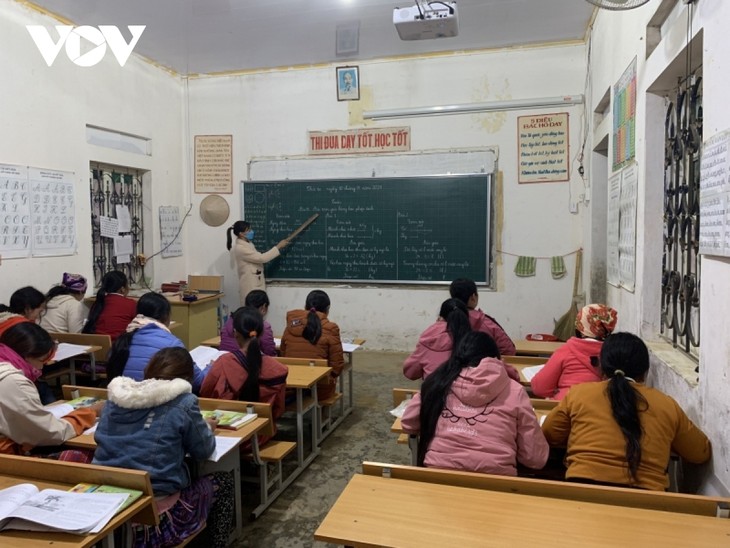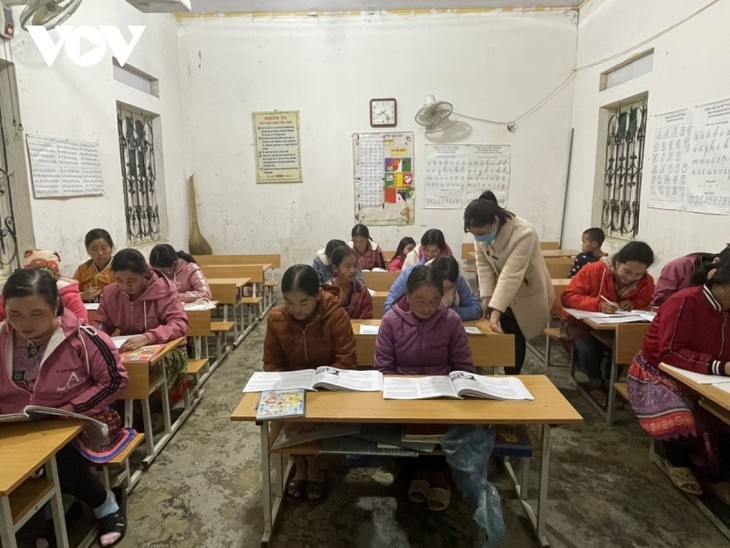(VOVWORLD) - The Pa Khen sub-area of Moc Chau town in Son La province is home to more than 500 ethnic Mong families. Special illiteracy eradication classes have been set up for Mong students of all ages.
 The special illiteracy eradication class is held every evening from Monday to Friday. The special illiteracy eradication class is held every evening from Monday to Friday. |
The Pa Khen sub-area illiteracy eradication classes opened in April at two schools.
Teachers were recruited from the May 19 primary and secondary School. Most of the students are their family’s primary wage earner. During the day they have to work at a factory or in the fields, so the only time they can attend class is in the evening. The class teaches them listening, speaking, reading, writing, and basic math skills.
Every evening from Monday to Friday, 41-year-old Song Thi Vang and other women from the Pa Khen sub-area attend the illiteracy eradication class, even though Vang’s house is far from the school.
“Due to my family’s financial difficulties, I never went to school. When I learned that there was a class for illiteracy eradication, I’ve registered immediately. Every day, despite all the farm work, I do my best to get to class on time, and I try to remember every word. Now that I can read and write, I can learn other things I need to know. The teachers are enthusiastic and care about us. I’m very happy now to be able to write," said Vang.
Although Giang Thi Ly is already married and has children, she is eager to attend the class because she wants to be able to read and write.
Like many other students in the class, instead of going to school Ly grew up helping her parents with the farming because her family was poor.
Ly has now learned to read, write, and do simple math. These skills are helping her a lot in her daily life.
“The class taught me to do calculations. When I sell something and receive money from the buyers, I known how much to keep and how much to return. It’s very useful. If someone asks me to write something, I can help them. If I have to sign my name, I don’t need to ask for help from others as I did in the past. I’m no longer illiterate,” said Ly.
All the students work hard, no matter if it's raining, cold, or hot, so the teachers have tried to develop the most practical curriculum for the students.
At the end of the course, Moc Chau district’s Department of Education and Training issues certificates to the students who have passed the course.
Teacher Tran Thi Huy says all the teachers admire the students and the determination they exhibit when their hands, calloused from hard work, clumsily grip a pen to practice their writing.
He said, “This is the second time I’ve taught a counter-illiteracy class. Now I have more experience in helping the students and know how important it is to get close to the students, encourage them to study hard, and meet their families to explain why the students need to attend the class regularly. Lessons should be as concise as possible, so the students can absorb them easily.”
 Every day despite all the farm work, trainees do the best to get to class on time. Every day despite all the farm work, trainees do the best to get to class on time. |
Among the illiterate people in the class, some had attended school previously but became illiterate because they never used the skills they had learned.
Teacher Pham Minh Thang, Vice Principal of the May 19 primary and secondary School, said, “Teachers should be flexible and adapt their teaching methods to each student’s capacity. Teachers are encouraged to volunteer to teach illiteracy eradication classes.”
Thang added, “Teaching literacy should be combined with teaching basic life skills, so they and their families will know, for example, how to prevent fires, explosions, drowning, and the spread of COVID-19. Cultural and sporting events should be organized. These programs can light up the faith and broaden the horizons of local ethnic people.”
Vuong Van Hoc, Deputy Head of the Education and Training Section of Moc Chau district, says the illiteracy rate in Moc Chau has dropped significantly.
“The education and training sector of Moc Chau district will continue to coordinate with political and social organizations to find out where illiteracy eradication and post-literacy education classes are needed.”
“We want 97% of the people between 15 and 60 years old to be literate by 2025. In extremely disadvantaged communes, we want 95% of the people aged between 15 and 35 to be literate. We hope the illiteracy eradication program will improve the lives of the people in Moc Chau district,” said Hoc.
Along with teaching basic skills, teachers have also disseminated Party guidelines and State laws and policies and encouraged people to abandon backward customs and maintain good habits.